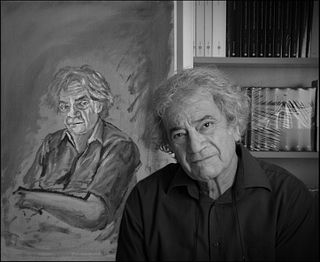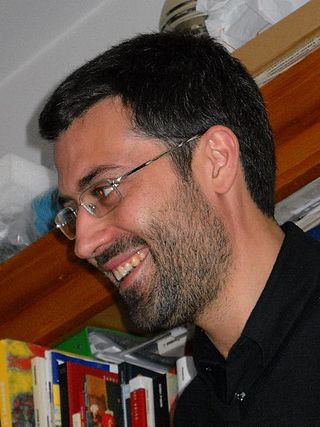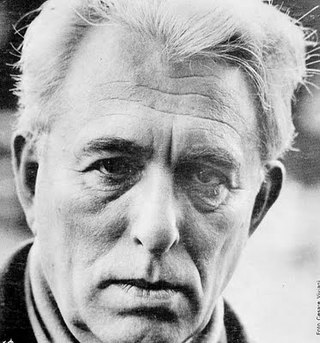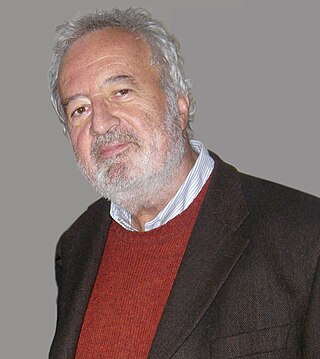
Piero Bernocchi (born 1947) is an Italian teacher, trade union officer and politician. He was a principal founder of Cobas, a workerist organization. [1]

Piero Bernocchi (born 1947) is an Italian teacher, trade union officer and politician. He was a principal founder of Cobas, a workerist organization. [1]
Piero Bernocchi was born on 13 September, 1947 in Foligno, Italy. He participated in the Italian social movements of the 1960s and the 1970s. Since 1968, he has been part of the coordination team for the departments of Science, as well as the Workers' Committee and leader of the movement at the Faculty of Engineering at the University of Rome. Among the main representatives of the movement of 1977, he was the director of a radio station, Radio Città Futura, a free Italian Radio.
He contributed to the creation of the Cobas school unit, which started in 1987. He is still the spokesman of the Cobas school unit and of the Cobas Confederation.
He played a notable role[ clarification needed ] in the organization of the World and European Social Forum against the liberal globalization movement starting from the first edition of the World Social Forum (WSF) in Porto Alegre in 2001 and of the European Social Forum (ESF) in Florence in 2002. He is also among the leaders of the 'noglobal' Italian movement, which was started in Genoa during the anti-G8 days in July 2001.
He has written essays, articles, and the following books: [2]
The Salimbeni Prize is awarded by the Fondazione Salimbeni per le Arti Figurative of San Severino Marche to honour excellence in the writing of art history on an Italian subject. The Premio Salimbeni was established in 1983.

Costanzo Preve was an Italian philosopher and a political theoretician.
Luigi Morleo is an Italian percussionist and composer of contemporary music, who lives in Bari and teaches at the Niccolò Piccinni Conservatory.
Luciano del Castillo is an Italian photographer and journalist specializing in war photography.

Beppe Costa is an Italian poet, novelist and publisher.

Andrea Bajani is an Italian novelist, poet, and journalist. After his debut with Cordiali saluti, it was Se consideri le colpe which brought him a great deal of attention. Antonio Tabucchi wrote about his debut novel, "I read this book with an excitement that Italian literature hasn't made me feel in ages." The book won the Super Mondello Prize, the Brancati Prize, the Recanati Prize and the Lo Straniero Prize.

Giorgio Ceragioli was an Italian engineer, professor and a leader in the pro-Third World movement in Italy.

Franco Fortini was the pseudonym of Franco Lattes, an Italian poet, writer, translator, essayist, literary critic and Marxist intellectual.

Paolo Consorti is an Italian artist and film director.

Fernando Vianello was an Italian economist and academic. Together with Michele Salvati, Sebastiano Brusco, Andrea Ginzburg and Salvatore Biasco, he founded the Faculty of Economics of the University of Modena and Reggio Emilia.

Pino Rucher was an Italian guitarist active in orchestral settings and in film soundtracks.
Marcello Landi (1916–1993) was an Italian painter and poet.

Franco Pappalardo La Rosa is an Italian journalist, literary critic, and writer. He graduated from Turin university. He has lived in Turin since 1963. He contributed to cultural pages of Giornale del Sud, L'Umanità and Gazzetta del Popolo, and to many dictionaries, as Dizionario della Letteratura Italiana, Grande Dizionario Enciclopedico-Appendice 1991 and Dizionario dei Capolavori. Nowadays he contributes to many literary magazines, as Hebenon, Chelsea and L'Indice. He edited the publication of some works written by contemporary Italian writers, as Stefano Jacomuzzi, Giorgio Bàrberi Squarotti, Emanuele Occelli, Francesco Granatiero and Angelo Jacomuzzi. He took part in National and International Conferences on figures and aspects of contemporary poetry and fiction. He edits I Colibrì, fiction library between journalism and literature. He is founding member and member of the Board of Governors of the International Association “Amici di Cesare Pavese”.

Andrea Garbin is an Italian poet. He was born in Castel Goffredo, Brescia, Italy.

Beatrice Monroy is an Italian writer and dramatist.
Pasquale Verrusio was an Italian painter, sculptor and engraver.
Nicoletta Maraschio is an academic teacher of "History of Italian Language" at University of Florence. She was the first woman in charge of Accademia della Crusca, from 2008 to 2014, succeeding Francesco Sabatini.

Minerva between Geometry and Arithmetic is a fresco fragment, usually attributed to Paolo Veronese, from 1550, but by some art historians to Anselmo Canera or Giambattista Zelotti. It was painted for the Palazzo de Soranzi in Castelfranco Veneto but is now in the Palazzo Balbi, in Venice.
Luca Poma is an Italian journalist, university professor, writer, and political adviser, having served as an adviser to the Italian Minister of Foreign Affairs Giulio Terzi di Sant'Agata.

Mao, stage name of Mauro Gurlino is an Italian singer-songwriter, composer, multi-instrumentalist, radio and television host and actor.